ReportWorX64 Viewer

The ReportWorX64 Viewer control in GraphWorX64 provides the ability to configure selected reports for viewing in Runtime mode in a GraphWorX64 display.
To Use the ReportWorX64 Viewer:
-
Within a GraphWorX64 display configuration, click on the Controls ribbon and then select the ReportWorX64 Viewer control. This activates the control with a "+", allowing you to draw a box within the display field to your preferred size/measurement. Once you release the mouse button, the control will populate with a report configuration form. The result will look similar to the image below.
Configuring the ReportWorX64 Viewer Control in GraphWorX64
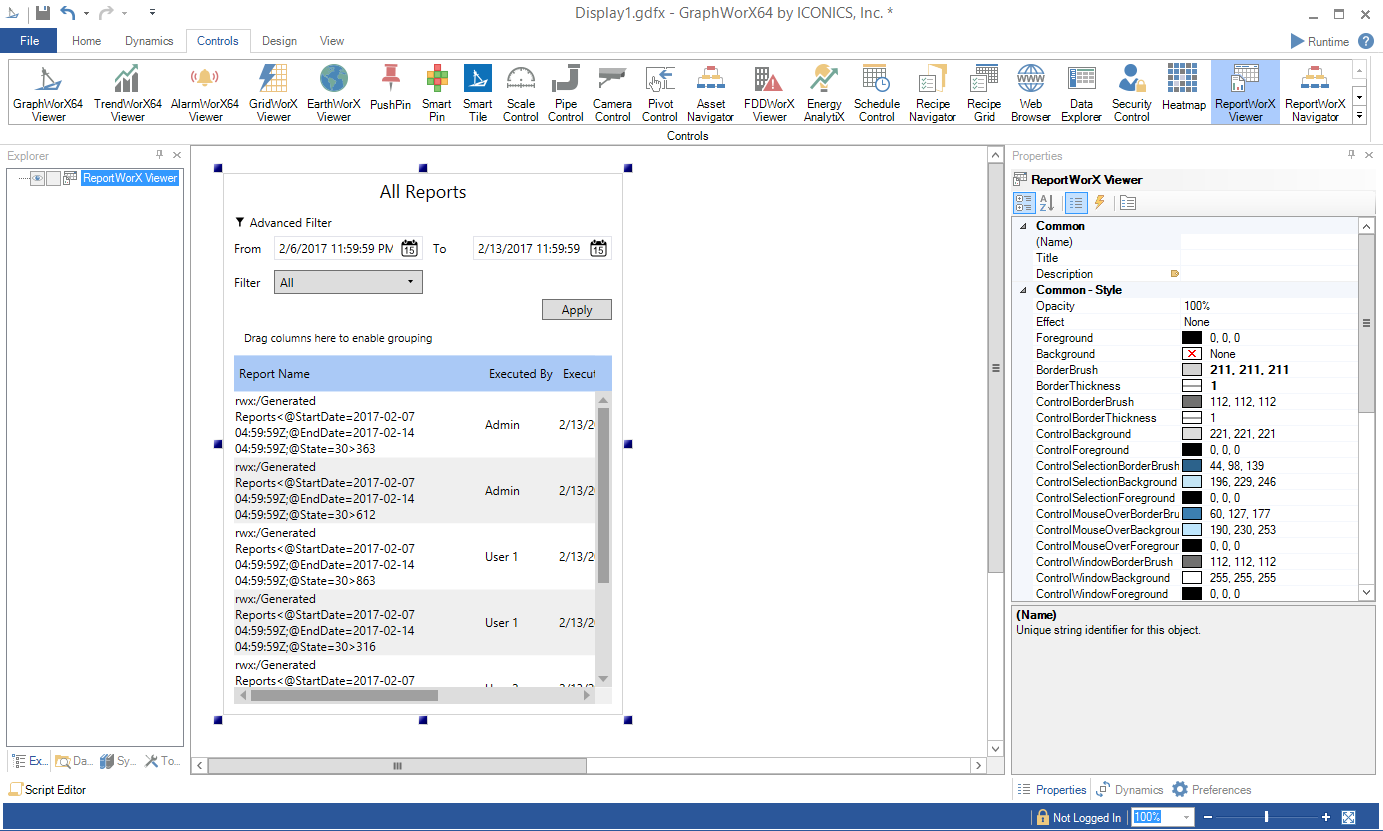
-
Once you have inserted the ReportWorX64 Viewer control, you can edit its properties by right-clicking on the box and selecting Object Properties.
ReportWorX64 Viewer Object Properties
The ReportWorX64 Viewer properties can be configured either through the Configuration window, shown below, or via the Properties section of the Workbench on the right side of the GraphWorX64 window.
Configuration Through the ReportWorX64 Viewer Configuration Window
General
ReportWorX64 Viewer Configuration Window - GENERAL Tab
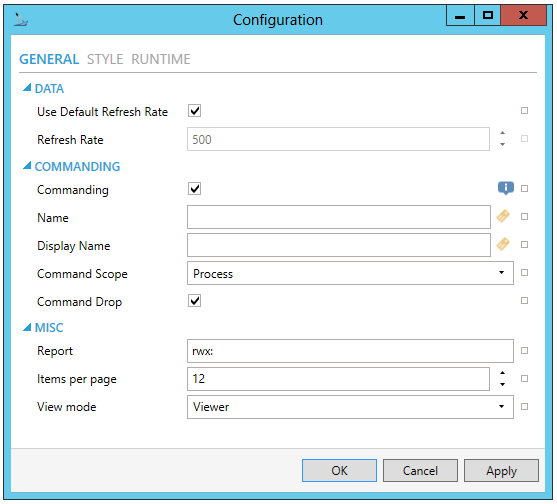
DATA
-
Use Default Refresh Rate -Use default refresh rate or refresh rate inherited from parent container.
-
Refresh Rate - Data refresh rate of data sources defined for properties, in milliseconds. Do not modify if you intend to use local variables for sharing data with other controls, e.g. selected asset or current time range.
COMMANDING
-
Commanding -Determines whether commands are enabled for this display. Use the CommandingName setting to specify a registration name.
-
Name -Name used for registering the control for commanding.
-
Display Name -User friendly control name.
-
Command Scope -Indicates whether commands sent and received by this display affect the current process only (Process) or all processes that are currently opened (Machine). For inter-process commanding, use the Machine option.
-
Command Drop -True to enable receiving commands by drag and drop.
MISC
-
Report - To view a specific report, enter the ReportWorX string with the report name. For example,
rwx:Audit Report. To view all reports, do not include the report name. For example,rwx:. -
Items per page - Enter the number of items per page in the text entry field or use the up/down arrow buttons.
-
Viewer Auto Update - To see changes made by other users in the Report Viewer, select the checkbox.
-
View mode - Use the pulldown menu to set the view mode as either Viewer or Executor.
-
Filter only by date - To restrict filtering in the Report Viewer to date selections only, select the checkbox.
STYLE
ReportWorX64 Viewer Configuration Window - STYLE Tab
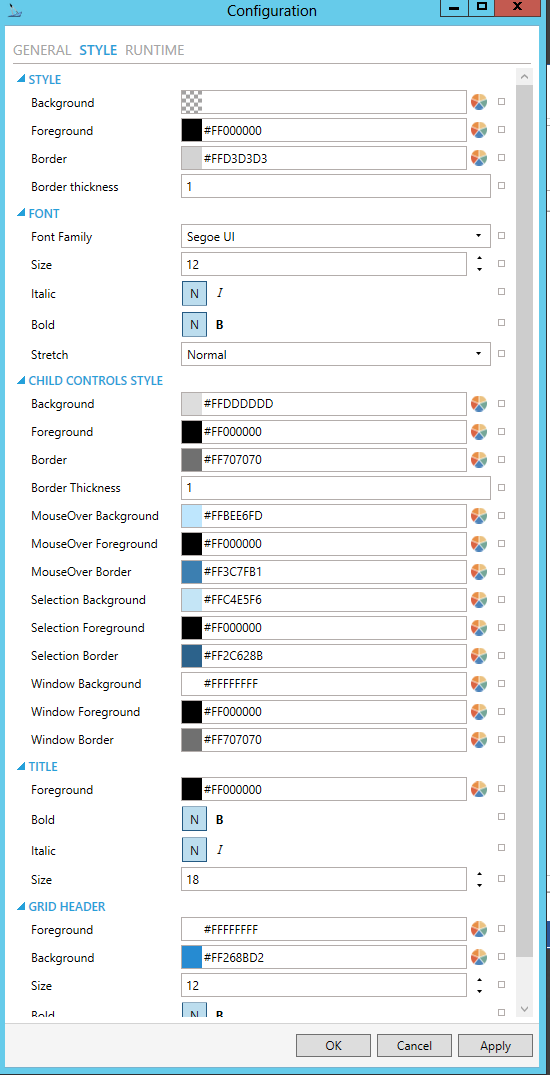
STYLE
-
Background - Background color, gradient or pattern of this object. You can enter a color code (if known) in the text entry field or click on the
 button to open the Brush Picker window and set the properties for
your background
button to open the Brush Picker window and set the properties for
your background -
Foreground - Foreground color, gradient or pattern of this object. You can enter a color code (if known) in the text entry field or click on the
 button to open the Brush Picker window and set the properties for
your foreround.
button to open the Brush Picker window and set the properties for
your foreround. -
Border - Color, gradient, or pattern of the border surrounding this object. You can enter a color code (if known) in the text entry field or click on the
 button to open the Brush Picker window and set the properties for
your border.
button to open the Brush Picker window and set the properties for
your border. -
Border thickness - Width of the border surrounding this object. Enter a thickness in the text entry field.
-
Alternate Styling -Enables alternate styling applied to every other row.
-
Alternate Background - Background applied to every other row if Alternate Styling is enabled. You can enter a color code (if known) in the text entry field or click on the
 button to open the Brush Picker window and
set the properties for your alternate background.
button to open the Brush Picker window and
set the properties for your alternate background. -
Alternate Foreground -Foreground applied to every other row if Alternate Styling is enabled. You can enter a color code (if known) in the text entry field or click on the
 button to open the Brush Picker window and
set the properties for your alternate foreground.
button to open the Brush Picker window and
set the properties for your alternate foreground.
NAVIGATOR STYLE
-
MouseOver Background - Background brush of item under mouse cursor. You can enter a color code (if known) in the text entry field or click on the
 button to open the Brush
Picker window and set the properties for your mouseover background.
button to open the Brush
Picker window and set the properties for your mouseover background. -
MouseOver Foreground - Foreground brush of item under mouse cursor. You can enter a color code (if known) in the text entry field or click on the
 button to open the Brush
Picker window and set the properties for your mouseover foreground.
button to open the Brush
Picker window and set the properties for your mouseover foreground. -
MouseOver Border - Border brush of item under mouse cursor. You can enter a color code (if known) in the text entry field or click on the
 button
to open the Brush Picker window and set the properties for your mouseover
border.
button
to open the Brush Picker window and set the properties for your mouseover
border. -
Selection Background - Background brush of selected item. You can enter a color code (if known) in the text entry field or click on the
 button to open the Brush Picker window and set the properties for
your selection background.
button to open the Brush Picker window and set the properties for
your selection background. -
Selection Foreground - Foreground brush of selected item. You can enter a color code (if known) in the text entry field or click on the
 button to open the Brush Picker window and set the properties for
your selection foreground.
button to open the Brush Picker window and set the properties for
your selection foreground. -
Selection Border - Border brush of selected item. You can enter a color code (if known) in the text entry field or click on the
 button to open
the Brush Picker window and set the properties for your selection
border.
button to open
the Brush Picker window and set the properties for your selection
border. -
Item Border Thickness - Border thickness of items. Enter a thickness in the text entry field.
-
Horizontal Gridlines -Brush of horizontal grid lines. You can enter a color code (if known) in the text entry field or click on the
 button
to open the Brush Picker window and set the properties for your horizontal
gridlines.
button
to open the Brush Picker window and set the properties for your horizontal
gridlines. -
Vertical Gridlines -Brush of vertical grid lines. You can enter a color code (if known) in the text entry field or click on the
 button to open
the Brush Picker window and set the properties for your vertical gridlines.
button to open
the Brush Picker window and set the properties for your vertical gridlines.
-
Header Background - Background brush of grid header. You can enter a color code (if known) in the text entry field or click on the
 button
to open the Brush Picker window and set the properties for your header
background.
button
to open the Brush Picker window and set the properties for your header
background. -
Header Foreground - Foreground brush of grid header. You can enter a color code (if known) in the text entry field or click on the
 button
to open the Brush Picker window and set the properties for your header
foreground.
button
to open the Brush Picker window and set the properties for your header
foreground. -
Header Border - Border brush of grid header. You can enter a color code (if known) in the text entry field or click on the
 button to open
the Brush Picker window and set the properties for your header border.
button to open
the Brush Picker window and set the properties for your header border.
FONT
-
Font Family - Specifies the name of the font used to render text. Use the pulldown menu to select from installed fonts.
-
Size - Specifies the size of the font used to render text. Enter a font size in the text entry field or use the up/down buttons.
-
Italic - Specifies the style of the font used to render text (italic). Select "N" for Normal or "I" for Italic.
-
Bold - Specifies the thickness of the font used to render text (bold) Select "N" for Normal or "B" for Bold.
-
Stretch - Specifies whether a font appears with a typical width (Normal) narrower than usual (Condensed), or wider than usual (Expanded). Use the pulldown menu to make your selection.
CHILD CONTROLS STYLE
- Background - Background
brush of child controls. You can enter a color code (if known) in
the text entry field or click on the
 button to
open the Brush Picker window and set the properties for your background.
button to
open the Brush Picker window and set the properties for your background. - Foreground - Foreground
brush of child controls. You can enter a color code (if known) in
the text entry field or click on the
 button to
open the Brush Picker window and set the properties for your foreground.
button to
open the Brush Picker window and set the properties for your foreground. - Border - Border brush
of child controls. You can enter a color code (if known) in the text
entry field or click on the
 button to open the Brush Picker window and set the properties for
your border.
button to open the Brush Picker window and set the properties for
your border. - Border Thickness - Border thickness of child controls. Enter a thickness in the text entry field.
- MouseOver Background
- Background brush of child controls under mouse cursor. You
can enter a color code (if known) in the text entry field or click
on the
 button to open the Brush Picker window and
set the properties for your mouseover background.
button to open the Brush Picker window and
set the properties for your mouseover background. - MouseOver Foreground
- Foreground brush of child controls under mouse cursor. You can enter
a color code (if known) in the text entry field or click on the
 button to open the Brush Picker window and set the properties for
your mouseover foreground.
button to open the Brush Picker window and set the properties for
your mouseover foreground. - MouseOver Border
- Border brush of child controls under mouse cursor. You can enter
a color code (if known) in the text entry field or click on the
 button to open the Brush Picker window and set the properties for
your mouseover border.
button to open the Brush Picker window and set the properties for
your mouseover border. - Selection Background
- Background brush of selected child controls. You can enter a color
code (if known) in the text entry field or click on the
 button to open the Brush
Picker window and set the properties for your selection background.
button to open the Brush
Picker window and set the properties for your selection background. - Selection Foreground
- Foreground brush of selected child controls. You can enter a color
code (if known) in the text entry field or click on the
 button to open the Brush
Picker window and set the properties for your selection foreground.
button to open the Brush
Picker window and set the properties for your selection foreground. - Selection Border
- Border brush of selected child controls. You can enter a color code
(if known) in the text entry field or click on the
 button to open the Brush Picker window and set the properties for
your selection border.
button to open the Brush Picker window and set the properties for
your selection border. - Window Background
- Background brush of child control windows. You can enter a color
code (if known) in the text entry field or click on the
 button to open the Brush
Picker window and set the properties for your background of child
control windows.
button to open the Brush
Picker window and set the properties for your background of child
control windows. - Window Foreground
- Foreground brush of child control windows. You can enter a color
code (if known) in the text entry field or click on the
 button to open the Brush
Picker window and set the properties for your foreground of child
control windows.
button to open the Brush
Picker window and set the properties for your foreground of child
control windows. - Window Border - Border brush of child control windows.
You can enter a color code (if known) in the text entry field or click
on the
 button to open the Brush Picker window and
set the properties for your border of child control windows.
button to open the Brush Picker window and
set the properties for your border of child control windows.
TITLE
-
Foreground -Foreground color, gradient or pattern of this object.
-
Bold -Specifies the thickness of the font used to render text (bold).
-
Italic -Specifies the style of the font used to render text (italic).
-
Size -Specifies the size of the font used to render text.
GRID HEADER
-
Foreground -Foreground color, gradient or pattern of this object.
-
Background -Background color, gradient or pattern of this object.
-
Size -Specifies the size of the font used to render text.
-
Bold -Specifies the thickness of the font used to render text (bold).
-
Italic -Specifies the style of the font used to render text (italic).
RUNTIME
ReportWorX64 Viewer Configuration Window - RUNTIME Tab
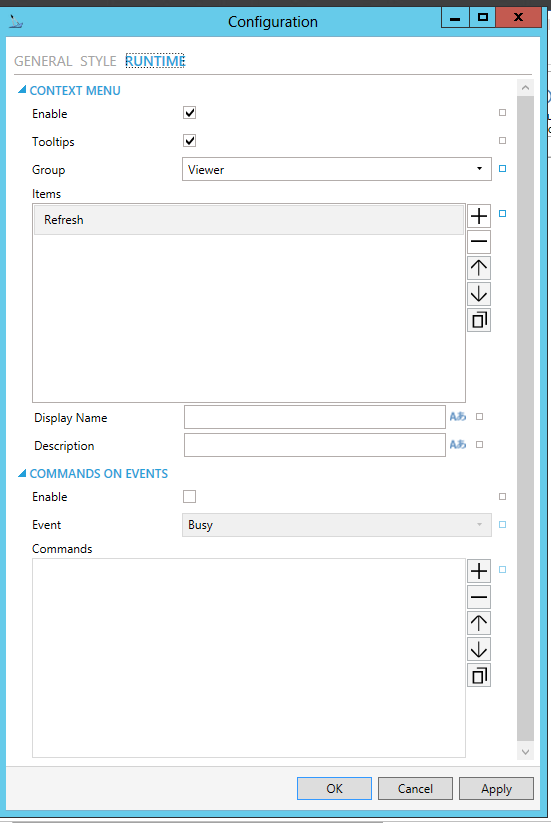
CONTEXT MENU
-
Enable - True to enable context menu on right click. Click the checkbox to enable context menu on right-click in the control. You can also click on the
 button to reset the current setting.
button to reset the current setting. -
Tooltips - Enables tooltips on hover in context menu items.
-
Invalid Menu Items - In the drop-down list, select the method of handling invalid menu items.
-
Hidden - Do not display the invalid menu items.
-
Disabled - Display but disable invalid menu items.
-
-
Group - Select context menu group for editing. Use the pulldown menu to select from any existing context menu group. You can also click on the
 button to reset the current setting.
button to reset the current setting. -
Items - Allows users to add items to a collection based on the selected Context Menu Group. Click on the plus sign [+] to add an item to the list. Click on the minus sign [-] to remove a listed item. Click on the up arrow to move a selected item higher in the list. Click on the down arrow to move a selected item lower in the list. Click on the
 button to duplicate a selected entry in the list.
button to duplicate a selected entry in the list.-
Refresh - Action to refresh this item.
-
Separator - Horizontal separator to separate groups of context menu items.
-
Custom Command - Custom command that can be configured to run any command with custom parameters. Use the pulldown menu to select the Command you wish to include as a Context Menu Item. Click HERE for more info on Commands in GraphWorX64.
-
-
Display Name - Set the name displayed in configuration collection. Enter a Display Name in the text entry field. Click on the
 button
to open the Data Browser to set any required Language Alias. You can
also click on the
button
to open the Data Browser to set any required Language Alias. You can
also click on the  button
to reset the current setting.
button
to reset the current setting. -
Description - Set the description displayed in tooltip in configuration collection. Enter a Description in the text entry field. Click on the
 button to open the Data
Browser to set any required Language Alias. You can also click on
the
button to open the Data
Browser to set any required Language Alias. You can also click on
the  button to reset the current setting.
button to reset the current setting. -
Command - (Custom Command) The command associated with the control. Use the pulldown menu to select from available commands. See the Commanding topic for command definitions. You can also click on the
 button to reset the current
setting.
button to reset the current
setting.
COMMANDS ON EVENTS
 The ReportWorX64 Viewer is one of many controls that now supports executing
commands on events. These events vary per control, but for the ReportWorX64
Viewer they include:
The ReportWorX64 Viewer is one of many controls that now supports executing
commands on events. These events vary per control, but for the ReportWorX64
Viewer they include:-
Busy
-
Ready
-
Row Selected: In Runtime, when a user selects a row (report) in the control, ReportWorX64 Viewer triggers the command configured above. For example, when you select a row, you can write a value to a point, refresh a control, or add a new pen.
-
Started
To configure the command to be executed when this event occurs, go to the Runtime tab. Find the Commands on Events section, select Enable Commands on Events, and then configure the form below.
-
Enable - Select True to enable configuring actions and commands for control events.
-
Event - Select a control event and configure actions to fire when the event occurs.
-
Commands - A list of commands to perform when the selected control event occurs. Click the plus sign (+) to add an item to the list. Click the minus sign (-) to remove an item. Click the up arrow to move a selected item higher in the list. Click the down arrow to move a selected item lower in the list. Click the
 button to duplicate
a selected entry in the list. For any custom command selected in the
list, select a specific command, and then complete the
associated properties for that command. Click
here for more information on commands in GraphWorX64.
button to duplicate
a selected entry in the list. For any custom command selected in the
list, select a specific command, and then complete the
associated properties for that command. Click
here for more information on commands in GraphWorX64.
ReportWorX64 Viewer Object Properties
Common
-
(Name) - Unique string identifier for this object.
-
Title - Title for this object. Unlike the Name property, the Title does not have to be unique.
-
Description - Description for this object. The Description typically appears as a tooltip for the object.
Common-Style
-
Opacity - Overall opacity of this object (0% = fully transparent. 100% = fully opaque).
-
Effect - Visual effects (3D-edge, shadow, glow, blue) applied to this object.
-
Foreground - Foreground color, gradient, or pattern of this object.
-
Background - Background color, gradient, or pattern of this object.
-
BorderBrush - Color, gradient, or pattern of the border surrounding this object.
-
BorderThickness - Width of the border surrounding this object.
-
ControlBorderBrush - Border brush of child controls.
-
ControlBorderThickness - Border thickness of child controls.
-
ControlBackground - Background brush of child controls.
-
ControlForeground - Foreground brush of child controls.
-
ControlSelectionBorderBrush - Border brush of selected child controls.
-
ControlSelectionBackground - Background brush of selected child controls.
-
ControlSelectionForeground - Foreground color of selected child controls.
-
ControlMouseOverBorderBrush - Border brush of child controls under mouse cursor.
-
ControlMouseOverBackground - Background brush of child controls under mouse cursor.
-
ControlMouseOverForeground - Foreground brush of child controls under mouse cursor.
-
ControlWindowsBorderBrush - Border brush of child control windows.
-
ControlWindowBackground - Background brush of child control windows.
-
ControlWindowForeground - Foreground brush of child control windows.
Measurements
-
Angle - The current angle of rotation for this object.
-
Left - Horizontal position of top-left corner of the object.
-
Top - Vertical position of the top-left corner of the object.
-
Width - Width of the object.
-
Height - Height of the object.
-
Padding - The amount of space surrounding the content of this object.
Misc
-
Report - This property can be set to a dynamic source tag.
-
View Mode - Use the pulldown menu to set the view mode as either Viewer or Executor.
Misc-Commanding
-
CommandingEnabled - Determines whether commands are enabled for this display. Use the CommandingName setting to specifiy a registration name.
-
DragAndDropCommandingEnabled - Set to True to enable receiving commands by drag and drop method.
-
CommandingName - Name used for registering the control for commanding.
-
CommandingDisplayName - User friendly control name.
-
MaxCommandScope - Indicates whether commands sent and received by this display affect the current process only (Process) or all processes that are currently opened (Machine). For inter-process commanding, use the Machine option.
Text
-
FontFamily - Specifies the name of the font used to render text.
-
FontSize - Specifies the size of the font used to render text.
-
FontStyle - Specifies the style of the font used to render text (italic).
-
FontWeight - Specifies the thickness of the font used to render text (bold).
-
-
After setting the Object Properties, the ReportWorX64 Viewer control can be saved when the containing GraphWorX64 display itself is saved.
ReportWorX64 Viewer Runtime
Putting a GraphWorX64 display containing a ReportWorX64 Viewer control into Runtime mode allows for additional options, as shown below.
The ReportWorX64 Viewer control can work in conjunction with the ReportWorX64 Navigator control within the same GraphWorX64 display. In the example below, the ReportWorX64 Navigator control can be seen in the right side of the display area.
ReportWorX64 Viewer in Runtime Mode in GraphWorX64
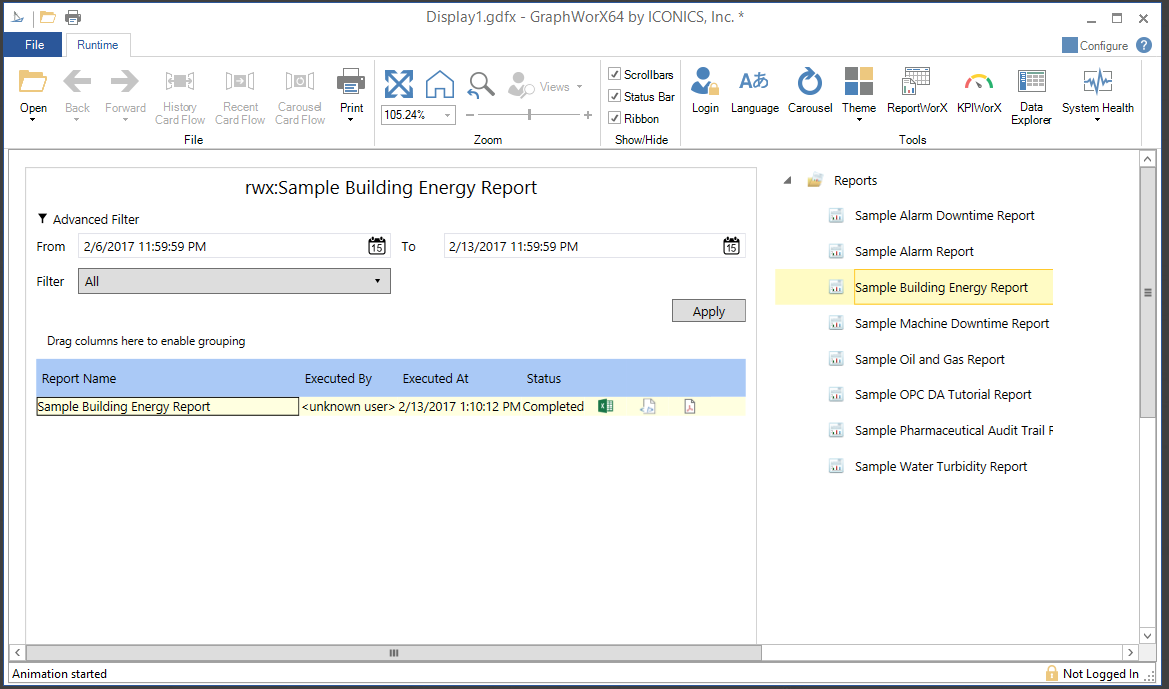
-
Advanced Filter - Click this link to show or hide the report selection criteria.
-
From - Enter a starting date (in the text entry field) to include reports or click on the
 button, which opens the date/time
picker tool and select your preferred date.
button, which opens the date/time
picker tool and select your preferred date. -
To - Enter an ending date (in the text entry field) to include reports or click on the
 button, which opens the date/time picker tool and select your preferred
date.
button, which opens the date/time picker tool and select your preferred
date. -
Filter - Use the pulldown menu to select from Completed, Queued, Running, Failed, Ignored or All.
-
Apply - Click this button to run your report search according the set selection criteria.
-
Drag columns here to enable grouping - When multiple items are listed in the bottom section of the viewer, you can drag columns to this area of the control to group by that column header.
For listed generated reports, you can see information including Report Name, Executed By, Executed At and Status.
You can also download (then subsequently open) a selected
report in multiple formats including Excel  (.xlsx),
HTML
(.xlsx),
HTML  (html in zip file [.zip]), or PDF
(html in zip file [.zip]), or PDF  (.pdf).
(.pdf).
See Also: